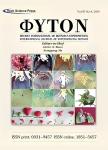Spatial Distribution of Nymphs Populations Bactericera cockerelli Sulc in Tomato Crops(Physalis ixocarpa Brot)
作者机构:Autonomous University of the State of MexicoCerrillo Piedras Blancas n/n km 15Toluca50200Mexico Laboratory of Entomology Research and Technology in Precision FarmingUAEMCerrillo Piedras Blancas n/n km 15Toluca50200México
出 版 物:《Phyton-International Journal of Experimental Botany》 (国际实验植物学杂志(英文))
年 卷 期:2019年第88卷第4期
页 面:449-458页
核心收录:
学科分类:09[农学] 0902[农学-园艺学] 090202[农学-蔬菜学]
主 题:Geostatistics Bactericera cockerelli Sulc Kriging
摘 要:Tomato crops(Physalis ixocarpa Brot.)are produced in almost all Mexico,part of the United States and Central *** the tomato production has suffered economic losses of 70%to 80%due the presence of yellowing and floral abortion,whose causal agent has been attributed to the presence of phytoplasma;an insect vector of these phytoplasma is Bactericera cockerrelli *** control of this psyllid has lacked effectiveness because their spatial distribution is unknown within tomato *** study aimed to determine the spatial distribution of populations of nymphs of *** in four tomato plots,the determination of the spatial distribution was performed by means of *** experimental semivariogram was determined to adjust to a theoretical model(spherical,exponential or Gaussian)through the program Variowin 2.2,the adjustment was validated with the method of cross-validation and aggregation maps of the pest were obtained through Kriging with Surfer 9.0 *** short-term time-space stability of the pest was determined through the tests Crámer-von *** results showed that populations of nymphs of *** have a distribution of aggregate type,which was corroborated by density *** are not present in 100%of the surface of the experimental plots,which helps to direct control measures on specific areas of infestation.



